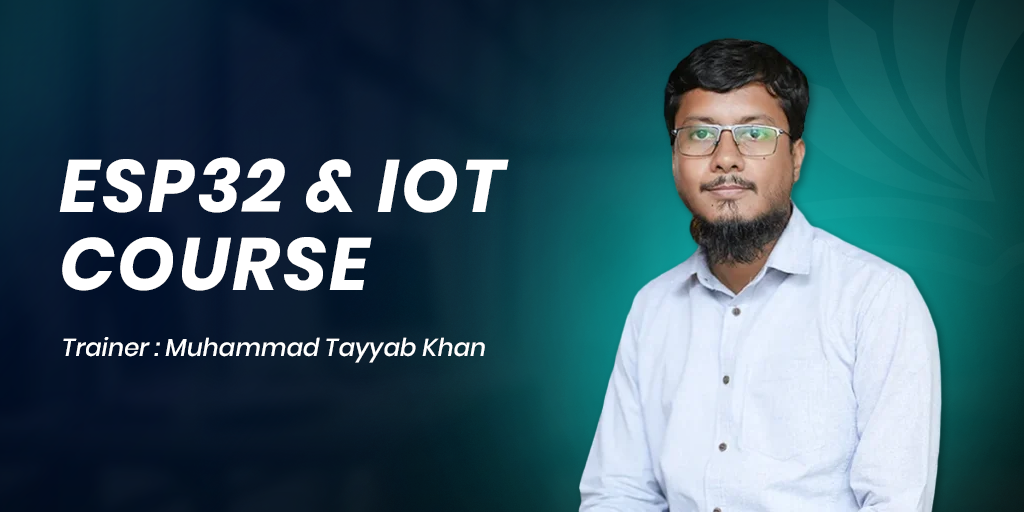- GOOD NEWS: On-going student will recieve 10% OFF!
Hands-on ESP32 and IoT training for building smart devices.

Learn the fundamentals of ESP32 and the Internet of Things (IoT), including key concepts of IoT architecture, sensor integration, wireless communication, data management, and real-world IoT applications.
This hands-on course is designed to teach you practical skills and techniques through building and deploying real-world IoT projects.
This course is for aspiring developers, hobbyists, and tech enthusiasts who want to master the skills required to create innovative IoT projects using the ESP32 platform. Whether you’re a complete beginner or already have some experience in electronics and programming, this course will equip you with the knowledge and hands-on experience needed to excel in IoT development.
You’ll learn everything from setting up the ESP32 environment and programming with Arduino IDE to interfacing sensors, working with communication protocols like MQTT and HTTP, and creating real-world IoT applications like smart home systems and weather monitoring stations.
By the end of this course, you’ll have a solid foundation in IoT development, along with the skills to build and deploy practical ESP32-based projects, ready to bring your innovative ideas to life.

Your Expert Trainer
Senior Software Engineer
3 Months
72 Total
6 Weekly Hours
Muhammad Tayyab Khan, a BS Electrical Engineering graduate from Sir Syed University, brings 8 years of electronics experience, including 2 years as an Embedded Firmware Developer. Renowned for simplifying complex IoT and embedded systems concepts, he offers clear, structured, and engaging guidance. Tayyab specializes in ESP32 and Internet of Things, helping students build strong foundations and practical skills.
His teaching blends technical expertise with real-world applications, ensuring learners confidently grasp both theoretical knowledge and hands-on experience for success in the tech industry
The ESP32 and IoT Week-by-Week Learning Pathway offers structured, hands-on training, guiding learners from basics to advanced projects, ensuring practical skills, sensor integration, and connectivity expertise for real-world IoT applications and career readiness
This month focuses on understanding the core principles and foundational concepts of the ESP32 microcontroller. By the end of this phase, you will have a solid grasp of the basics required to start building IoT applications with the ESP32.
Learn how to set up and configure the ESP32 board in the Arduino IDE. Master the essential steps for installing libraries and preparing your development environment for seamless coding.
Dive into the ADC functionality of the ESP32. Understand how to read analog signals, interpret sensor data, and work with voltage levels for real-world applications.
Explore the capacitive touch functionality of the ESP32. Learn to design touch-based interfaces and applications, adding interactivity to your IoT projects.
Master pulse-width modulation (PWM) with the ESP32. Understand how to control devices like LEDs, motors, and other peripherals by generating PWM signals.
Enhance your skills by learning how to configure and handle GPIO interrupts. Discover how to make your IoT projects responsive and event-driven with this advanced functionality.
This month focuses on enhancing your skills in creating web interfaces and understanding advanced connectivity options with the ESP32. By the end of this phase, you’ll be equipped to develop IoT applications with web servers and Bluetooth communication.
Learn how to set up a basic web server using the ESP32 in the Arduino IDE. Understand how to serve web pages and interact with connected devices via a browser.
Discover how to connect DHT11 and DHT22 sensors to the ESP32. Build a web server to monitor and display temperature and humidity readings in real-time.
Learn to integrate multiple DS18B20 temperature sensors with the ESP32. Develop a web interface to display readings from multiple sensors efficiently.
Gain insights into the Bluetooth Classic capabilities of the ESP32. Learn how to set up Bluetooth communication for data exchange between devices.
Understand the fundamentals of Bluetooth Low Energy (BLE) on the ESP32. Explore its low-power capabilities to build energy-efficient IoT devices.
This month focuses on hands-on projects and exercises to help you deepen your understanding of the ESP32. By the end, you’ll have a collection of practical IoT applications and projects to showcase your skills.
Learn the fundamentals of Over-The-Air (OTA) programming with the ESP32. Understand how to wirelessly upload code updates, making development and deployment more efficient.
Discover how to connect and use an OLED graphic display with the ESP32. Learn to display text, shapes, and graphics, creating interactive and visually appealing interfaces.
Master the use of I2C-based LCD displays with the ESP32. Understand the wiring, setup, and coding to display data from sensors and other sources effectively.
Integrate and use various sensors with the ESP32. Learn how to collect, process, and display sensor data, building IoT applications that monitor environmental conditions and measure distances.
We offer hands-on training and real-world project experience to help students and professionals excel in their careers.